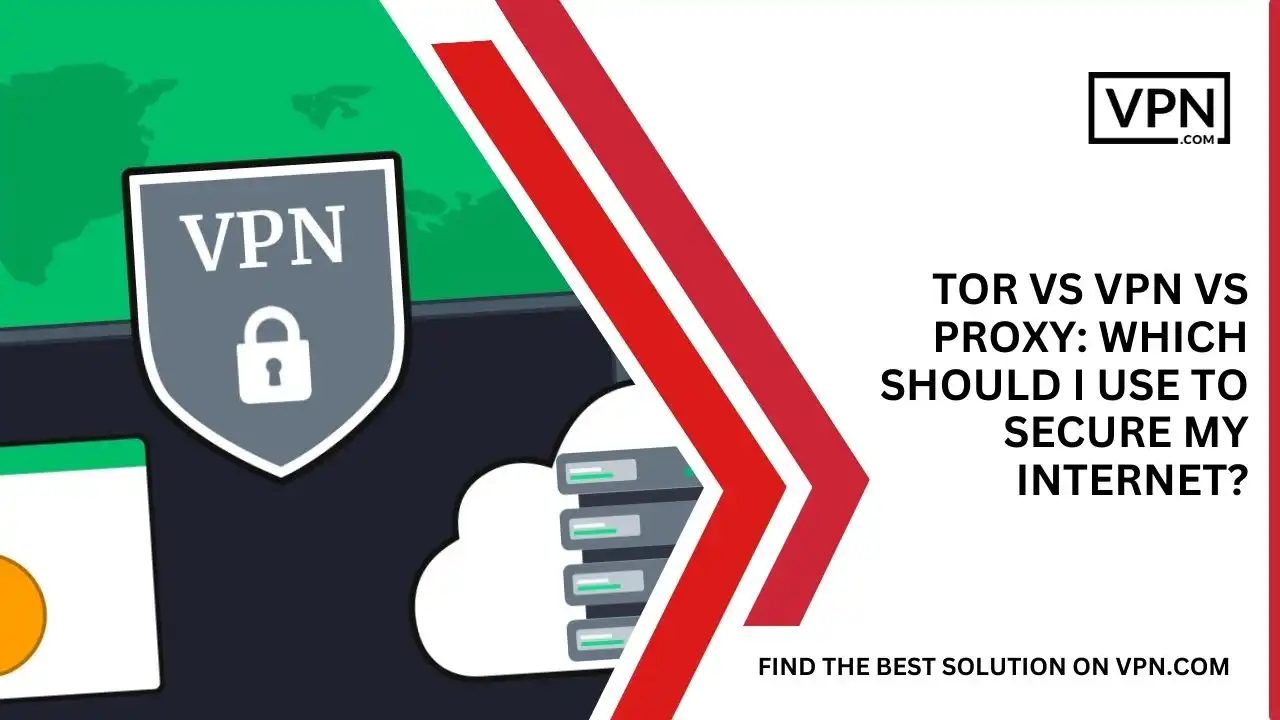Tor vs VPN vs Proxy: Which Should I Use To Secure My Internet?

Tor vs VPN vs Proxy is a query every person searches on the internet who wants to protect their online identity along with their IP Address to identify & select which one can help to provide them with the ultimate security & privacy.
Do you remember the old days when people thought their online identity was secure behind their 7 Proxies, it turns out that no matter how many proxies you use, your IP Address will never be safe until you get a premium subscription to NordVPN & ExpressVPN.
In this article, we’ll discuss what Tor vs VPN vs Proxy is, how they work & operate, and which one you should choose to secure your internet connection. Therefore, let’s not waste a single second, and start this journey to achieve the highest level of privacy without costing a lot of money.
What is Tor Browser?

The Tor Browser is a free network of access points called “nodes” that act as proxies for internet connections. It routes your connection through multiple nodes before reaching its end destination, encrypting traffic for added safety. However, certain websites can block recognized Tor exit nodes.
Traffic on the network is encrypted, so it’s basically a safer option than proxies, but like any other free service, Tor Exit Nodes are recognizable, and some high-level websites like Hulu, Netflix, HBO, etc can block your IP Address.
The Tor Browser encrypts traffic and is often touted for its security features. However, malicious entities operating certain nodes can potentially alter traffic, and the browser is under surveillance due to its frequent use in cybercrime.

Get Started w/ NordVPN Today
- Top-rated VPN for OS unknown
- Ultra-fast speed in US in 2024
- Save 69% off with VPN.com Discount
- Plans starting at $2.99/month
- Rated 4.5/5 on Google Play with over 825,000 reviews
- Rated 4.7/5 on Apple App Store from 6,600 users
Tor Security
Anyone who wants true anonymity on the internet, especially in 2023 when cybercrime has become one of the biggest internet problems, can check out the amazing features of Tor Browser.
No hacker has ever become successful in breaking its encryption methods due to traffic fingerprinting to determine what content a user wants to access. You can also monitor the packet count and identify where the connection is coming from, and where it’s going.
According to most Deep Web Guides on the internet, “Tor Browser is under constant scrutiny by government agencies because it’s often used by hackers for cybercrimes.” They attempt to mask their identities and break the cybersecurity rules & regulations to use these browsers for all types of shady work.
What is VPN?

Virtual Private Network, encrypts internet traffic between a device and server through a tunneling process, hiding the IP address and offering enhanced privacy. The connection between your device and the VPN server is encrypted, ensuring that your online activities remain private.
VPNs have the ability to hide your IP Address and change it with a unique identifier of another country’s IP Address where you want to connect your virtual private server to enjoy fast internet speed, stable connection, stream HD Content, Download GBs of files, etc.
What Does a VPN Server Do?
Do you know that a premium virtual private network is quite different from the free proxy servers and Tor Browsers if we’re discussing who is better, Tor vs VPN vs Proxy Servers?
A VPN works similarly to a Proxy Server like when your signal travels to a VPN Server, it gets encrypted by the VPN Software before it leaves your device. Now no one can see what you’re doing online, and if someone tries to track you, they’ll just see jumbled signals including your ISP that don’t make any sense.
When the encrypted connection reaches the VPN Server through the tunnel, all the signals or data packets get decrypted and then sent back to the destination. The website you’re browsing on your device and your Virtual Private Server keep sending each other encrypted & decrypted signals to make the whole communication secret & private from other people.
ChaCha20 and AES 256-bit Encryption are some of the most advanced methods to encrypt your traffic & anonymize your traffic.
Benefits Of VPN

Let’s take a look at some of the best benefits of using a Virtual Private Network:
- VPN Tunneling
- Strict No Logging Policy
- Ultimate Privacy & Security
- Kill Switch
- Access To All Blocked Websites
- Change The Server Of Your Streaming Platforms
- Unblock All The Blocked Websites
VPNs offer benefits like IP address masking, access to blocked websites, secure browsing, and more. They can shield your online activities, offer a no-logging policy, and protect against potential security threats.
Most people think that Paid VPNs are a drawback of VPNs while the free VPNs don’t have any technical feature or authority to protect your strict no logs policy, kill switch, VPN Tunneling, extra privacy & security, access to all types of restricted content across the globe, unblock all type of blocked websites, and help you to change the server of your Hulu, Amazon, and Netflix Accounts.
VPN Concerns
VPNs also aren’t all safe, if you look at the numbers on the Play Store and App Store, they provide free virtual private network services to their customers because they have the reputation of stealing their customers’ private data and selling it to third parties.
We recommend you only use NordVPN & ExpressVPN as they both are included in every premium virtual private network list due to the quality of the services they provide at affordable rates.
Should I Use a Free VPN?
If you want our opinion, we advise you not to use free VPNs as they’re against the whole purpose of why you need a virtual private network in the first place. Free VPNs take pride in filling your screen with unnecessary pop-ups and unethical ads while they’re stealing your private information only to sell it to the government and third parties.
What is Proxy?

A Proxy Server is an intermediary connection point that masks your actual IP address by providing a different one. It allows users to access web servers as if they’re in a different location. However, they often lack security features found in VPNs and the Tor Browser.
When you use a proxy server, your connection is first sent to the proxy server where a proxy acts as an intermediary connection point to trick the receiving web server into thinking your location & IP Address are different from what they really are.
However, Proxy Servers have serious issues due to the unsecured connection they provide with encryption which can reveal your true IP Address and location, if you get caught while doing some shady work in the proxy servers, then the government, your ISP, and any third party who has the access of your proxy servers would see it & take legal actions.
Here is a list of the two main types of Proxy Servers:
HTTP Proxy Servers
HTTP Proxies are specially created for the internet traffic as you can enter the IP Address of the proxy you want to connect to in your browser’s setting & traffic is routed through that server.
No Peer-to-Peer Connection, No Encryption Method, and No SSL/TLS as they all aren’t suitable for HTTP proxy which means you have to make sure the websites you connect to support TLS especially if you’re inputting sensitive information.
SOCKS Proxy Servers
SOCKS Proxies are better than HTTP Proxy Servers as they’re traffic agnostic where you can send any traffic through a SOCKS proxy whether it is a FTP connection, P2P Connection, and basic website traffic.
In addition, SOCKS Proxies have the same issues that HTTP Proxy Servers have as there’s no encryption outside, and the speed and traffic load are up in the air. Furthermore, SOCKS Proxy Servers are slower than HTTP Proxy Servers.
Free Proxy Servers vs Paid Proxies
As we all know, Free Proxy Servers are bad for security, but what about paid proxy servers, and which one should we choose?
In this article, we’ll discuss each & everything, but for starters let’s talk about the paid ones that you might think can protect your privacy, but reality is different.
Paid Proxy Servers were not created for individuals who crave privacy, instead, they were created for the companies to scrape data from websites.
Do you know that most corporations block the IP Addresses of other businesses so that they can’t access their information & private data–That’s where paid proxy servers came in with their ability to access the blocked content all over the world.
Proxy Concerns
When considering proxy vs VPN vs tor, it’s important to understand the differences. It doesn’t matter whether you use free or paid proxy servers, they can’t keep your IP Address private, protect you from cyberattacks, or keep you off the search & browser tracking as they’re only meant to unblock the websites that are blocked in your region.
In the debate of proxy vs VPN vs tor, free Proxy Servers are often seen as the least effective. They are the worst if you look at the numbers, as they don’t have encryption methods, inconsistent uptime, and slow internet speed, with the addition of malware & ransomware attacks.
Tor vs VPN vs Proxy: Overview

If you’re asking for our opinion on “Tor vs VPN vs Proxy: Which Should I Use To Secure My Internet?” We advise you to use a premium virtual private network like NordVPN & ExpressVPN which are a complete package for all your cybersecurity needs.
Tor is a good private browser that can provide you with the anonymity to browse the internet but comes at the price of a very slow internet, and on the other hand, proxy servers are nothing but an old & ugly way to access blocked websites, while VPN is the only tool which can offer you the ultimate security with fast internet speed.

Get Started w/ NordVPN Today
- Top-rated VPN for OS unknown
- Ultra-fast speed in US in 2024
- Save 69% off with VPN.com Discount
- Plans starting at $2.99/month
- Rated 4.5/5 on Google Play with over 825,000 reviews
- Rated 4.7/5 on Apple App Store from 6,600 users
Conclusion
Tor vs VPN vs Proxy isn’t a new term but has been revolving around the internet since the last 10 years when cybersecurity was becoming a concern for individuals and small & large companies.
We have told you about everything you need to know before you make up your mind & choose between Tor vs VPN vs Proxy, and if you have any donuts and questions regarding the Tor vs VPN vs Proxy Servers, please comment down your queries or send us an email with your intrusive thoughts so we can help you out.
Customer Reviews for NordVPN: In-Depth Review, Tests, and Stats

Connection issues with MLB.TV
May, 2 2023

Prompt customer service
May, 6 2023

I would highly recommend
December, 15 2023



